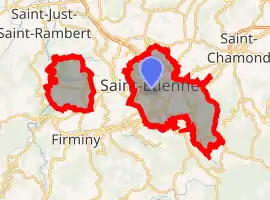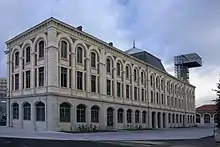Saint-Étienne
Saint-Étienne (French pronunciation: [sɛ̃t‿etjɛn]; Arpitan: Sant-Etiève; Occitan: Sant Estève, [ˈsantesˈtɛβe]) is a city in eastern central France, in the Massif Central, 60 km (37 mi) southwest of Lyon in the Auvergne-Rhône-Alpes region, on the trunk road that connects Toulouse with Lyon. Saint-Étienne is the prefecture of the Loire department.[4]
Saint-Étienne
| |
|---|---|
Prefecture and commune | |
 | |
 Flag  Coat of arms | |
Location of Saint-Étienne  | |
 Saint-Étienne  Saint-Étienne | |
| Coordinates: 45°26′05″N 4°23′25″E | |
| Country | France |
| Region | Auvergne-Rhône-Alpes |
| Department | Loire |
| Arrondissement | Saint-Étienne |
| Canton | Saint-Étienne-1, 2, 3, 4, 5 and 6 |
| Intercommunality | Saint-Étienne Métropole |
| Government | |
| • Mayor (2020–2026) | Gaël Perdriau[1] (LR) |
| Area 1 | 79.97 km2 (30.88 sq mi) |
| Population | 173,821 |
| • Rank | 14th in France |
| • Density | 2,200/km2 (5,600/sq mi) |
| Demonym | Stéphanois[3] |
| Time zone | UTC+01:00 (CET) |
| • Summer (DST) | UTC+02:00 (CEST) |
| INSEE/Postal code | 42218 /42000, 42100 |
| Elevation | 422–1,117 m (1,385–3,665 ft) (avg. 516 m or 1,693 ft) |
| Website | www.saint-etienne.fr |
| 1 French Land Register data, which excludes lakes, ponds, glaciers > 1 km2 (0.386 sq mi or 247 acres) and river estuaries. | |
Saint-Étienne is the 13th most populated commune in France and the 2nd most populated commune in Auvergne-Rhône-Alpes. Saint-Étienne Métropole is the 3rd most populous regional metropolis after Grenoble Alpes and Lyon. The municipality is also at the heart of a vast metropolitan area with 497,034 inhabitants (2018),[5] the 18th largest in France by population, comprising 105 municipalities.[6]
Long known as the French city of the "weapon, cycle and ribbon" and a major coal mining centre, Saint-Étienne is currently engaged in a vast urban renewal program aimed at leading the transition from the industrial city inherited from the 19th century to the "design capital" of the 21st century. This approach was recognized with the entry of Saint-Étienne into the UNESCO Creative Cities network in 2010. The city is currently undergoing renewal, with the installation of the Châteaucreux business district, the Steel shopping centre and the Manufacturing creative district.
The city is known for its football club AS Saint-Étienne who have won the Ligue 1 title a record ten times.
History
Named after Saint Stephen, the city first appears in the historical record in the Middle Ages as Saint-Étienne de Furan (after the River Furan, a tributary of the Loire). In the 13th century, it was a small borough around the church dedicated to Saint Stephen. On the upper reaches of the Furan, near the Way of St. James, the Abbey of Valbenoîte had been founded by the Cistercians in 1222. In the late 15th century, it was a fortified village defended by walls built around the original nucleus.
From the 16th century, Saint-Étienne developed an arms manufacturing industry and became a market town. It was this which accounted for the town's importance, although it also became a centre for the manufacture of ribbons and passementerie starting in the 17th century.
Later, it became a mining centre of the Loire coal mining basin, and more recently, has become known for its bicycle industry.
In the first half of the 19th century, it was only a chief town of an arrondissement in the département of the Loire, with a population of 33,064 in 1832. The concentration of industry prompted these numbers to rise rapidly to 110,000 by about 1880. It was this growing importance of Saint-Étienne that led to its being made seat of the prefecture and the departmental administration on 25 July 1855, when it became the chief town in the département and seat of the prefect, replacing Montbrison, which was reduced to the status of chief town of an arrondissement. Saint-Étienne absorbed the commune of Valbenoîte and several other neighbouring localities on 31 March 1855.
Population
The population data in the table and graph below refer to the commune of Saint-Étienne proper, in its geography at the given years. The commune of Saint-Étienne absorbed the former communes of Beaubrun, Montaud, Outre-Furent and Valbenoîte in 1855, ceded Planfoy in 1863, merged with the exclave Saint-Victor-sur-Loire and with Terrenoire in 1969 and Rochetaillée in 1973.[7]
|
| ||||||||||||||||||||||||||||||||||||||||||||||||||||||||||||||||||||||||||||||||||||||||||||||||||||||||||||||||||
| Source: EHESS[7] and INSEE (1968-2017)[8] | |||||||||||||||||||||||||||||||||||||||||||||||||||||||||||||||||||||||||||||||||||||||||||||||||||||||||||||||||||
Culture
Saint-Étienne became a popular stop for automobile travelers in the early 20th century.
In 1998, Saint-Étienne set up a design biennale, the largest of its kind in France.[9] It lasts around two weeks. A landmark in the history of the importance ascribed to design in Saint-Étienne was the inauguration of La Cité du design on the site of the former arms factory in 2009.
The city also launched the Massenet Festivals, (the composer Jules Massenet hailed from the area) devoted mainly to perform Massenet's operas. In 2000, the city was named one of the French Towns and Lands of Art and History. On 22 November 2010, it was nominated as "City of Design" as part of UNESCO's Creative Cities Network.[10]
Saint-Étienne has four museums:
Climate
The climate is temperate at the weather station due to its low altitude, but Saint-Étienne itself is much higher, above 530 m (1739 ft) in downtown, and even above 700 m (2297 ft) in the southern parts of the city. Actually, Saint-Étienne is very close from a warm-summer humid continental climate (Köppen: Dfb), and is generally the snowiest city of France, with an average of 85 cm (2.79 ft) of snow accumulation per year.
| Climate data for Saint-Étienne–Bouthéon Airport (1991–2020 normals, extremes 1946–present), Alt: 400 m / 1312 ft | |||||||||||||
|---|---|---|---|---|---|---|---|---|---|---|---|---|---|
| Month | Jan | Feb | Mar | Apr | May | Jun | Jul | Aug | Sep | Oct | Nov | Dec | Year |
| Record high °C (°F) | 20.0 (68.0) |
23.2 (73.8) |
26.4 (79.5) |
28.8 (83.8) |
33.7 (92.7) |
37.8 (100.0) |
41.1 (106.0) |
39.3 (102.7) |
36.0 (96.8) |
29.2 (84.6) |
25.2 (77.4) |
20.2 (68.4) |
41.1 (106.0) |
| Average high °C (°F) | 7.3 (45.1) |
8.8 (47.8) |
13.1 (55.6) |
16.3 (61.3) |
20.3 (68.5) |
24.5 (76.1) |
26.9 (80.4) |
26.9 (80.4) |
22.2 (72.0) |
17.3 (63.1) |
11.4 (52.5) |
8.0 (46.4) |
16.9 (62.4) |
| Daily mean °C (°F) | 3.8 (38.8) |
4.5 (40.1) |
7.8 (46.0) |
10.7 (51.3) |
14.6 (58.3) |
18.5 (65.3) |
20.7 (69.3) |
20.6 (69.1) |
16.4 (61.5) |
12.7 (54.9) |
7.6 (45.7) |
4.6 (40.3) |
11.9 (53.4) |
| Average low °C (°F) | 0.3 (32.5) |
0.2 (32.4) |
2.6 (36.7) |
5.0 (41.0) |
9.0 (48.2) |
12.6 (54.7) |
14.4 (57.9) |
14.2 (57.6) |
10.7 (51.3) |
8.1 (46.6) |
3.7 (38.7) |
1.1 (34.0) |
6.9 (44.4) |
| Record low °C (°F) | −25.6 (−14.1) |
−22.5 (−8.5) |
−13.9 (7.0) |
−7.4 (18.7) |
−3.9 (25.0) |
−0.6 (30.9) |
2.9 (37.2) |
1.1 (34.0) |
−2.6 (27.3) |
−6.2 (20.8) |
−10.6 (12.9) |
−18.6 (−1.5) |
−25.6 (−14.1) |
| Average precipitation mm (inches) | 38.3 (1.51) |
30.3 (1.19) |
33.9 (1.33) |
55.0 (2.17) |
81.5 (3.21) |
80.8 (3.18) |
77.2 (3.04) |
72.8 (2.87) |
70.3 (2.77) |
76.2 (3.00) |
73.0 (2.87) |
39.0 (1.54) |
728.3 (28.67) |
| Average precipitation days (≥ 1.0 mm) | 7.8 | 7.0 | 7.1 | 9.2 | 10.1 | 8.8 | 7.8 | 7.6 | 7.5 | 8.7 | 8.7 | 7.6 | 97.9 |
| Average snowy days | 5.1 | 5.8 | 2.5 | 1.1 | 0.0 | 0.0 | 0.0 | 0.0 | 0.0 | 0.0 | 1.5 | 4.6 | 20.5 |
| Average relative humidity (%) | 81 | 78 | 73 | 71 | 72 | 72 | 68 | 71 | 75 | 80 | 81 | 83 | 75.4 |
| Mean monthly sunshine hours | 81.4 | 108.6 | 162.3 | 186.2 | 213.7 | 240.7 | 275.1 | 259.1 | 193.2 | 134.7 | 87.6 | 75.8 | 2,018.4 |
| Source 1: Météo France[11] | |||||||||||||
| Source 2: Infoclimat.fr (humidity, 1961–1990)[12] | |||||||||||||
Sport

The city's football club AS Saint-Étienne has won the Ligue 1 title a record ten times, achieving most of their success in the 1970s. The British indie-dance band Saint Etienne named themselves after the club.
St. Étienne has many sports stadiums, the largest being Stade Geoffroy-Guichard used for football and Stade Henri-Lux for athletics. St. Étienne was the capital of the French bicycle industry. The bicycle wheel manufacturer Mavic is based in the city and frame manufacturers Motobécane and Vitus are also based here. The city often hosts a stage of the Tour de France.
St. Étienne resident Thierry Gueorgiou is a world champion in orienteering. The local rugby union team is CA Saint-Étienne Loire Sud Rugby.
Transport



The nearest airport is Saint-Étienne - Bouthéon Airport which is located in Andrézieux-Bouthéon, 12 km (7.46 mi) north-northwest of Saint-Étienne. The main railway station is Saint-Étienne-Châteaucreux station, which offers high speed services to Paris, Lyon (Saint-Étienne–Lyon railway), and several regional lines. There are four other railway stations in Saint-Étienne (Bellevue, Carnot, La Terrasse and Le Clapier) with local services.[13]
Saint-Étienne is also notable for its tramway (Saint-Étienne tramway) – which uniquely with Lille, it kept throughout the 20th century – and its trolleybus system (Saint-Étienne trolleybus system) – which is one of only three such systems currently operating in France.
Bus and tram transport is regulated and provided by the Société de Transports de l'Agglomération Stéphanoise (STAS), a public transport executive organisation.
The bicycle sharing system Vélivert with 280 short term renting bicycles has been available since June 2010.
Colleges and universities
- Jean Monnet University
- École d'Économie - Saint-Étienne School of Economics (SE²)
- École Nationale Supérieure des Mines de Saint-Étienne (EMSE or ENSMSE)
- École nationale d'ingénieurs de Saint-Étienne (ENISE)
- Telecom Saint Etienne (TSE)
- EMLYON Business School
- ENSASE (Ecole National Supérieure d'Architecture de Saint-Étienne)
Notable people
Saint-Étienne was the birthplace of:
- René Diaz, French journalist and illustrator
- Augustin Dupré (1748–1833), engraver of French coins and medals, France's 14th graveur général des monnaies
- Claude Fauriel (1772–1844), historian, philologist and critic
- Saint Marcellin Champagnat (1789–1840), Catholic priest and founding members of the Society of Mary (Marist Fathers) who founded the Marist Brothers and was canonised in 1999
- Antonin Moine (1796–1849), sculptor
- Jules Janin (1804–1874), writer and critic
- Francis Garnier (1839–1873), officer and explorer who explored the Mekong River, much to the surprise of the inhabitants
- Lucie Grange (1839-1908), medium, feminist prophet, newspaper founder
- Jules Massenet (1842–1912), composer best known for his operas
- Paul de Vivie, aka Velocio (1853–1930), publisher of Le Cycliste, early champion of the dérailleur and father of French cycle touring
- Claudine Chomat (1915–1995), member of the French Resistance during World War II, feminist, communist activist
- Jean Bonfils (1921–2007), classical organist and composer
- André Bourgey (1936), geographer
- Jean-Michel Othoniel (1963), contemporary artist
- Bernard Lavilliers (b. 1946), (Bernard Ouillon), singer
- Orlan (1947–), contemporary artist
- Willy Sagnol (b. 1977), French International football player
- Jean Guitton (1901–1999), Catholic philosopher and theologian
- Thierry Gueorgiou (b. 1979), Orienteering world champion
- Norma Ray (born 1970), singer
- Alexis Ajinça (born 1988), basketball player
- Sylvain Armand (born 1980), footballer
- Sliimy (born 1988), singer
- Aravane Rezai (born 1987), tennis player
- Loïc Perrin (born 1985), footballer
It was also the place where Andrei Kivilev died.
International relations
Saint-Étienne is twinned with:
|
See also
- Manufacture d'armes de Saint-Étienne
- Saint-Étienne Cathedral
- Saint-Étienne – Gorges de la Loire Nature Reserve
- André César Vermare, sculptor of Franco-Prussian war memorial
References
- "Répertoire national des élus: les maires". data.gouv.fr, Plateforme ouverte des données publiques françaises (in French). 2 December 2020.
- "Populations légales 2019". The National Institute of Statistics and Economic Studies. 29 December 2021.
- "Top 10 des choses à faire pour être 100% stéphanois". Saint-Étienne CityCrunch (in French). 28 March 2018. Retrieved 3 April 2021.
- INSEE commune file
- Comparateur de territoire, INSEE
- Aire d'attraction des villes 2020 de Saint-Étienne (023), INSEE
- Des villages de Cassini aux communes d'aujourd'hui: Commune data sheet Saint-Étienne, EHESS. (in French)
- Population en historique depuis 1968, INSEE
- "La Biennale Internationale Design Saint-Étienne". Cité du design. Retrieved 7 June 2018.
- St-Etienne and Sydney nominated UNESCO Creative Cities , 22 November 2010.
- "ST ETIENNE−BOUTHEON (42)" (PDF). Fiche Climatologique: Statistiques 1991–2020 et records (in French). Meteo France. Retrieved 14 July 2022.
- "Normes et records 1961-1990: Saint-Étienne - Bouthéon (42) - altitude 400m" (in French). Infoclimat. Archived from the original on 8 April 2016. Retrieved 26 December 2015.
- Réseau TER et cars Auvergne-Rhône-Alpes, TER Auvergne-Rhône-Alpes, accessed 30 May 2022.
- Griffin, Mary (2 August 2011). "Coventry's twin towns". Coventry Telegraph. Retrieved 6 August 2013.
- "Coventry - Twin towns and cities". Coventry City nonoCouncil. Archived from the original on 12 April 2013. Retrieved 6 August 2013.
- "British towns twinned with French towns". Archant Community Media Ltd. Retrieved 11 July 2013.
External links
 Saint-Étienne travel guide from Wikivoyage
Saint-Étienne travel guide from Wikivoyage- City council website
- Tourist board official website